- Home
- Tim LaHaye
Black Friday Page 2
Black Friday Read online
Page 2
“Yes? Can I help you?”
He shuffled forward two steps, stopped, looked around, and then took two more steps. From this distance the smell of urine, mixed with a body odor strong enough to repel a skunk, assaulted her nose. Jodi clutched her purse to her side. She slipped her finger over the car’s panic button on the key chain.
“Miss, I’m sorry to bother you,” he said. His voice was deep and had an almost sad quality to it. “You work here, don’t you.”
“Um, I do, but I’m kinda new here,” Jodi said, her discomfort growing by the second. She’d been coming to work just over a week and had never seen him before. She figured by now she would at least have seen him pushing a shopping cart filled with assorted treasures.
Come to think of it, she couldn’t remember seeing a homeless person in all of Huntingdon Valley, probably because it was an uppermiddle-class suburb bordering the northern edge of Philadelphia.
Of course, had she been standing in Philly, meeting a homeless man wouldn’t have been a surprise. They were everywhere. Take your pick. But definitely not here. She pegged him as just another crazy man who grabbed at his crotch in public like some kind of rap star.
Jodi surveyed her surroundings to see if she could tell how he’d managed to get there. Did he drive? No. She was familiar with the six other cars in the parking lot. Bus? There was a bus stop two blocks away, she noted. Maybe. Didn’t matter. She was due at her desk, and whatever this guy wanted, well, somehow she had to find a way to detach herself from the conversation.
Jodi figured she’d try making a big deal of looking at her watch. Maybe he’d get the hint. “Uh, look at the time. If you don’t mind, I’m running kinda late. Maybe we could talk inside?”
He nodded at that. “Running kinda late,” he said, repeating her words. “Late. Yes. We’re all too late most of the time, aren’t we? We don’t want to be, but we are. Life is like that most of the time. We’re too late.”
Jodi looked around to see if anybody inside the glass front doors was aware of her situation. The receptionist desk, which faced the doorway, was unoccupied.
Not good. Marge was probably at lunch.
Then again, there were the security cameras around the building. Two were aimed at the parking lot. She wasn’t sure if they worked, or, even if they did, she had no way of knowing if anybody was monitoring them.
Calm down, she told herself. The guy’s probably just a homeless man looking for a handout. It was lunchtime.
“My name’s Gus. Gus Anderson.” He made no effort to shake her hand. His head just jerked from side to side, paused, then jerked back and forth again.
“Nice to meet you, Gus.” Jodi bit her lip. “I’m Jodi. Listen, Gus, my boss is expecting me—”
“Expecting me,” Gus said, his eyes suddenly as lifeless as a mannequin’s. “One minute we’re expecting, the next we’re not. Expecting. Not expecting. Expecting is good. Do you believe that, missy?”
Jodi took a deep breath. “Is there something you wanted to tell me?”
He raised a hand to the side of his face and tugged at the ends of his beard. Several f lakes of dried food floated downward as he played with the tufts of hair.
“Tell me . . . yes . . . tell . . . tell all . . .”
“I’m sorry, Gus, but I’ve got a job to do.” Jodi offered a thin smile and then backed away several steps.
“Miss . . . ah . . . Jodi?”
She regretted mentioning her name. Jodi planted her feet so that she could, if necessary, make a run for the doors. “Yes?”
Gus reached into the folds of his shabby suit coat and produced a white, business-size envelope. He held the wrinkled item up to the sun as if looking to see if it contained money. A moment later, his hand outstretched, he offered it to Jodi. “Please. Take it. It’s the truth. It’s all in there.” His voice was calm and surprisingly steady, with a hint of urgency.
Jodi hesitated. To get the envelope, she’d have to come within a few feet of the stranger. And why take it? What did this have to do with her? Couldn’t he go bother someone else with his ramblings? Then again, it was the middle of the day. He looked harmless enough.
She took a tentative step toward Gus.
With some effort, she willed herself to lean forward, pluck it out of his hand, and then retreat to a safe distance. “Um, do you want me to, like, mail this for you?”
A look of bewilderment, like a dark cloud, drifted across his face. “I thought you said you work here?”
“I do.”
He nodded and then scratched his head. “Why would I want to mail it? It’s for the paper. Give it to the paper. Go on, Miss Jodi.”
The envelope was sealed. She stole a look at the front of it and noticed the name of the newspaper was handwritten in block type across the middle. In the upper left corner, he had written, “Gus Anderson, MD.” Great, this nut case thinks he’s a doctor, Jodi thought.
“I’ll be sure to give it to the right people,” Jodi said. “Now, if you’ll excuse me.”
As she walked away, she could hear Gus repeating her words. “The right people,” he said. “Yes, the right people. Not the wrong people. No. Don’t give it to the wrong people. Too many people are the wrong people. Wrong people will keep things from the right people. Give it to the right people.”
When Jodi reached the front doors, she looked over her shoulder toward the place where she’d just had the most unusual conversation of her life. Gus was gone. She began to think she’d imagined the whole thing, except the dirty white envelope in her hand was evidence to the contrary.
Once inside the pint-size lobby, the smell of newsprint replaced the smell of Gus. Jodi’s eyes took a quick minute to adjust to the dim fluorescent lighting. She quickly stuffed the envelope into her purse, figuring she’d decide what to do with it later.
She walked through the maze of half-height, cloth-covered metal partitions to her cubical against the far rear wall. As she made her way through the room, something dawned on her that she hadn’t noticed before. The walls had no pictures. There were no paintings.
No splashes of cheerful color.
No copies of award-winning back issues to motivate the employees. She saw nothing but the dull, tired-looking olive-gray paint everywhere she looked. The carpet wasn’t much better. The thin, indoor-outdoor carpet was a drab medium brown, which, in an odd way, matched the yellowed ceiling tiles. Some were stained in places, marking former leaks in the roof.
Even the phones on the desks were ancient, probably replaced during medieval times, she thought. The one exception to the collection of dated equipment was the shiny new Power Mac with an oversize f lat screen, situated on the desk of the designer.
Still, it was a thrill to be working for a newspaper. The people she had met so far had been welcoming, almost like a family. And Jodi especially loved the energy when the cubicles were buzzing with activity. With only two private offices, you could hear the conversations of a dozen people at any given time. The exception was lunch. During lunchtime, the activity dropped to a dull hum.
Jodi reached her desk, a small, metal thing with a well-worn Formica top. She tossed her purse and keys in the bottom drawer, f licked on the switch to the microfiche reader, an archaic, yet useful device that preserved back issues of the Montgomery Times newspaper. It sat on a stand to her left, which put her back to the room as she worked. She resumed her assignment.
“Let me guess, you’re the star summer intern that I’ve been hearing so much about.”
Jodi spun around on her swivel chair. Their eyes met.
“I’m Joey Stephano.” He extended his hand across the cubical wall. “We’re glad to have you on board.”
“Jodi Adams,” she said, taking his hand. She swallowed. She tried to remember what she had planned to say when they met but only managed to utter, “Hi, um, sir.”
Sir? Where did that come from?
Joey Stephano’s eyes were dark, yet bright. They sparkled against his olive skin. His
black hair was trimmed short and combed to the side. His shirt collar, opened one button too many, revealed a thick gold chain around his neck. He wore khaki pants and a black belt. She couldn’t see his shoes but figured they’d be loafers. He didn’t fit the profile, at least not in her mind, of a newspaper editor—certainly not of the owner. He couldn’t be more than forty.
Jodi remembered to breathe. “Pleased to meet you, too, Mr. Stephano.”
“Mister, nothing. Call me Joey.” He held her hand several moments longer than she had expected. “Let’s take a walk. They’ve probably shown you the place, but with me you’ll get the official tour.” He smiled.
Jodi stood, hooked her hair over her right ear, and walked to his side.
“Have my people been taking good care of you, Jodi?” He put his hand lightly around the back of her arm and nudged her down the center aisle.
“They’ve been great, really, sir.” She wanted to kick herself for saying “sir” again.
Joey stopped and then looked her in the eyes. “Let’s get one thing straight.”
She waited.
“When you say, ‘sir,’” he said with that sparkle in his eyes, “I start looking for my dad in the room. It’s Joey. We’re one big family around here. Nobody has to kiss up to me—I have no patience for that kind of thing. Nobody needs an appointment to talk to me. Maybe that’s how it’s done at other newspapers, but not here. How’s that sound?”
“Okay with me, um, Joey,” she said, trying to conceal a nervous laugh.
He started to walk again. “Good. Now, as you might have guessed, I’m Italian. So, as a kid, I always thought I’d open a little hole-in-the wall place, you know, with a name like ‘Joey’s Pizza.’ Got a nice ring to it—am I right?”
She nodded, taken by his openness. Seemed like she was really part of the team, and it felt nice.
“Anyway, I ended up doing college—excuse me, I attended an institution of higher learning—got bit by the journalism bug, found I had a knack for words and telling stories. Got a job at the Inquirer.” He stopped in his tracks and raised a hand as if to signal something of utmost importance was about to be revealed.
“That’s my office,” he said, now pointing toward the corner room. Glass panels rose from floor to ceiling. The outside walls had one window with a view of a pine tree. “It’s nothing spectacular. Me? I prefer what’s functional. I even had the door taken off—like I said, I have an open-door policy.” He laughed at his own joke.
Jodi smiled in return.
“Basically, I arranged the building into two work areas,” Joey said. “Editorial and subscriptions, which is where you and I are, and, if you’ll follow me . . . sales and advertising are on this side.”
Like a duckling following her mother, Jodi followed Joey through a short, wide hall to the adjacent work area. Here, nine desks were arranged in three rows of three. Each identical. Each with a phone, a chair, and a Rolodex. Joey continued to talk as they toured the building.
“The big city paper wasn’t for me. You’re just a number.” He stopped, leaned toward her, and said, “They don’t encourage creativity. Forget about following your nose when you’re hot on the trail of a breaking story.” He tapped the side of his nose.
They walked slowly through the open room. “Anyway, ten years of that,” Joey said, “and I’m looking for the door. Next thing I know, a buddy tells me this paper is going to file bankruptcy. It would be a genuine fire sale. I sold everything, scraped together the cash . . . and here we are,” he said with a wave of his hand.
“How long ago did you buy it?”
Joey stopped by the doorway to the only other private office. “That would be, what, about eighteen months—am I right, Roxanne?”
Roxanne didn’t look up from the piles of paper that buried every square inch of her desktop. Her fingers hovered above an adding machine. A cigarette hung from her mouth as a ring of smoke circled her head like a ring around Saturn. “Eighteen months, twelve days.”
“Roxanne is our accountant. Oh, and Rox, this is Jodi Adams, our intern.”
“We’ve met,” Roxanne said, still without looking up.
“She’s a sweetheart once you get to know her,” Joey said to Jodi, placing a hand in the center of her back as he guided her down the hall. “Rox is a fixture around here. Got her when we bought the place. She knows everything about everything. But if she barks, it’s probably because she ran out of smokes. She probably does three packs a day. It’s a wonder she’s still alive.” He laughed.
“You mentioned the paper was close to bankruptcy,” Jodi said. “How are things now?”
Joey eyed her with what Jodi thought was a mixture of surprise and appreciation at her interest. “Truth is, our subscriptions are up—I think we’re at forty-five thousand weekday subs, with something like fifty-one thousand on the Sunday edition. Of course, the money isn’t in the subscriptions.”
“Really?”
“No. Little-known secret . . . advertising pays the bills,” he said. “Classified ads, space ads, and something new for us. I recently began to test ‘P.I.’ ads,” he said, leading her past the desks and into a smaller room.
“P. I.?”
“That’s per inquiry. We can get into that later.”
“Mr. Stephano—sorry, Joey? Can I ask another question?” she said.
“Yes, Jodi?”
“I was kinda wondering if the security cameras outside the building worked?”
His left eyebrow shot up. “Well, no. Not yet. Why? Somebody giving you trouble out there?”
“Just wondering,” she said, taken by his surprise. “I happened to notice them when I came to work. It’s no big deal, really.”
“Actually, the previous owner installed them but never made the final connections,” he said. “Which reminds me to get that done—”
Jodi was about to mention Gus when Marge the receptionist, a heavyset, fiftyish woman, waddled toward them, huffing as she moved. Her glasses rested on her heaving chest, suspended by a cord that traveled around her neck. Her hair was cut short and permed, but little loose strands floated carelessly in several directions as if pulled by an unseen source of static electricity.
“Joey,” she said, not waiting to be recognized. “I got an urgent call for you on line two—from the bank.” A second later, she noticed Jodi. “Oh, hey, Jodi. Sorry to interrupt you guys.” Marge looked back at Joey. “So, what do you want me to tell him? You out of the office, or what?”
Joey offered a broad, toothy grin. “Better take that. Tell Old Moneybags I’ll be right with him.”
Marge nodded, turned to the nearest desk, punched the blinking light on the six-line phone, and then conveyed the message.
“The joys of owning your own business,” Joey said to Jodi with a sigh. He led her by the arm back through the room, pausing by his doorway. “Well, there you have it. Like I said, glad you’re on the team. I’ve got another project for you to work on—we’ll talk this afternoon. Me? Gotta keep the loan sharks at bay.” With that, he ducked into his space.
Jodi retraced her steps back to her work station. She liked her boss. She liked his warm, down-to-earth manner. She liked the way he made her feel, too. She felt as if her being at the paper actually mattered. This job was turning out to be even better than she’d first expected.
As she sat down, something bothered her. It was something she meant to say or do. But what? Then it hit her.
The envelope.
She had forgotten to give Joey the envelope from Gus. At her desk, Gus’s words echoed in her mind: “Wrong people will keep things from the right people.”
What did he mean by that?
Chapter 3 Tuesday, 4:40 p.m.
Stan Taylor walked in the front door of the Abington Memorial Hospital, an imposing brick structure that dominated several city blocks. It was the oldest and largest hospital in the area. Stan knew he had been born somewhere in this edifice a little more than seventeen years ago. This was the first
time he’d been back.
He paused long enough to catch the reflection of his profile in the glass door. The image that stared back at him was a stranger. He thought he’d never looked so bad in his life. The stubble on his unshaven face was uneven and blotchy. His eyes were puffy, accented with enough red lines to give a bottle of Visine a real workout.
Stan stepped through the door and into an open but cramped lobby area with a brown tile floor.
“Can I help you?” a voice said.
Stan’s gaze drifted to the nurse behind the reception desk. He looked at the palm of his hand where he had scribbled a room number. “Yeah, could you tell me how to get to room 513?”
“Certainly,” she said. She pointed to her right. “Take those elevators to the fifth floor. When you exit, make a left and go through the first set of doors. The nurses’ station can direct you from there.”
“Okay, good,” Stan said. “Um, thanks.” He strode to the bank of three elevators, pushed the call button, and watched the numbers above the doors. The back of his neck throbbed, and he reached around to massage the dull pain. His body ached from sleeping in his car.
With a ping, the center doors opened. He took a step forward and then stopped. A woman in a wheelchair was wheeled out by a chatty nurse. The woman’s arms embraced a newborn baby, wrapped in a pink receiving blanket, close to her chest. Stan couldn’t take his eyes off the infant. Her little eyes were scrunched closed. She was so perfect and she looked so . . . helpless.
The doors began to close on the empty elevator. Stan jolted forward and stuck his right hand in the way, causing the doors to retract. He stepped in. He was surprised to find a fresh batch of tears welling up around the edges of his tired eyes. He didn’t think it was possible for a human—for a guy, especially, to have so many tears.
He pushed the button for the fifth floor and then stood against the rear wall of the compartment. With a thump, his head fell back against the panel. He closed his eyes as the elevator, moving as slow as molasses on a cold day, pulled itself up the shaft. “I can’t do this, God.”
A heavy sigh escaped his chest. He hated the feeling of being so weak. He was, after all, Stan “da Man.” His buddies on the football team would have a field day if they saw him behaving like this—crying at the sight of an infant. How ridiculous was that?

 Glorious Appearing: The End of Days
Glorious Appearing: The End of Days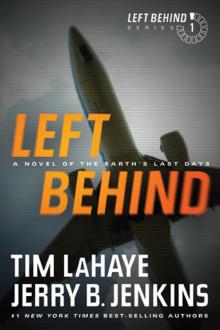 Left Behind: A Novel of the Earth's Last Days
Left Behind: A Novel of the Earth's Last Days Kingdom Come: The Final Victory
Kingdom Come: The Final Victory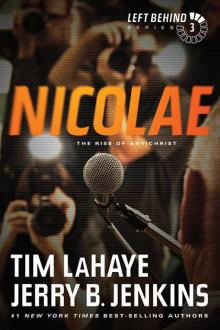 Nicolae: The Rise of Antichrist
Nicolae: The Rise of Antichrist Desecration: Antichrist Takes the Throne
Desecration: Antichrist Takes the Throne Mark's Story: The Gospel According to Peter
Mark's Story: The Gospel According to Peter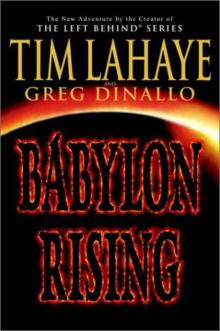 Babylon Rising
Babylon Rising Thunder of Heaven: A Joshua Jordan Novel
Thunder of Heaven: A Joshua Jordan Novel The Edge of Darkness
The Edge of Darkness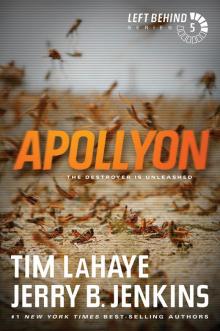 Apollyon: The Destroyer Is Unleashed
Apollyon: The Destroyer Is Unleashed Armageddon: The Cosmic Battle of the Ages
Armageddon: The Cosmic Battle of the Ages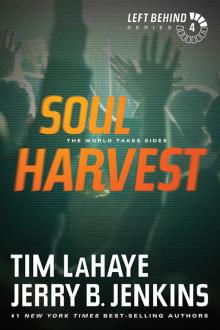 Soul Harvest: The World Takes Sides
Soul Harvest: The World Takes Sides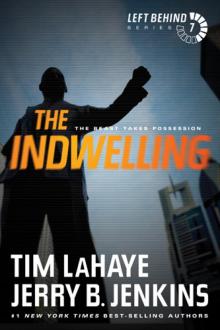 The Indwelling: The Beast Takes Possession
The Indwelling: The Beast Takes Possession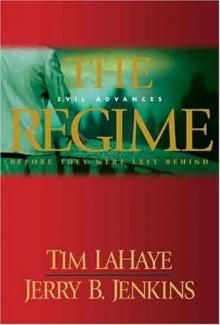 The Regime: Evil Advances
The Regime: Evil Advances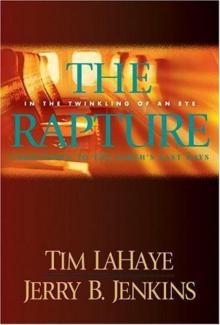 The Rapture: In the Twinkling of an Eye / Countdown to the Earth's Last Days
The Rapture: In the Twinkling of an Eye / Countdown to the Earth's Last Days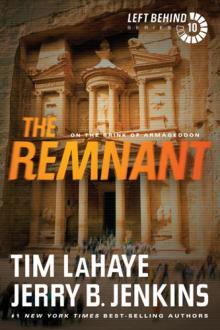 The Remnant: On the Brink of Armageddon
The Remnant: On the Brink of Armageddon John's Story: The Last Eyewitness
John's Story: The Last Eyewitness The Europa Conspiracy
The Europa Conspiracy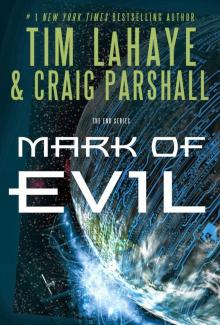 Mark of Evil
Mark of Evil Brink of Chaos
Brink of Chaos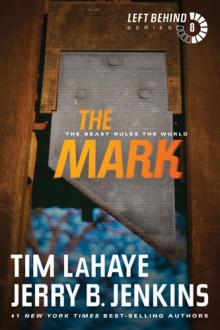 The Mark: The Beast Rules the World
The Mark: The Beast Rules the World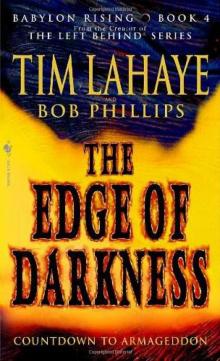 04 The Edge of Darkness
04 The Edge of Darkness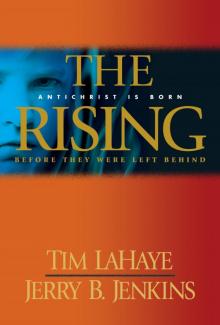 The Rising: Antichrist is Born / Before They Were Left Behind
The Rising: Antichrist is Born / Before They Were Left Behind Babylon Rising: The Edge of Darkness
Babylon Rising: The Edge of Darkness 03 The Europa Conspiracy
03 The Europa Conspiracy Desecration
Desecration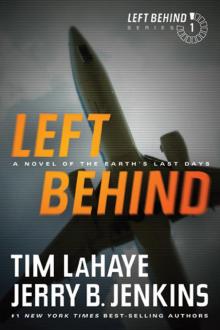 Left Behind
Left Behind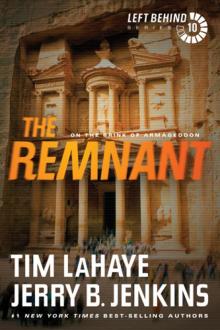 The Remnant
The Remnant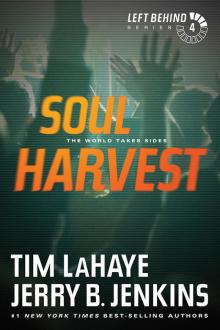 Soul Harvest
Soul Harvest Left Behind Book 13: Kingdom Come The Final Victory
Left Behind Book 13: Kingdom Come The Final Victory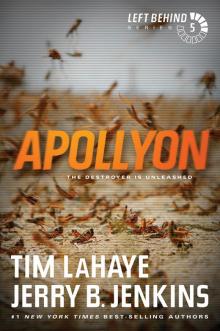 Apollyon
Apollyon 02 Thunder of Heaven: A Joshua Jordan Novel
02 Thunder of Heaven: A Joshua Jordan Novel Glorious Appearing
Glorious Appearing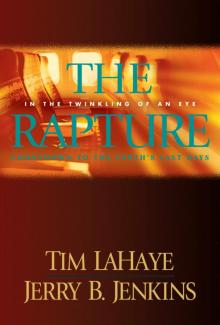 The Rapture: Evil Advances / Before They Were Left Behind
The Rapture: Evil Advances / Before They Were Left Behind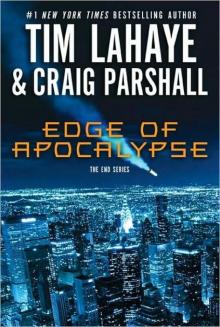 Edge of Apocalypse
Edge of Apocalypse Tribulation Force
Tribulation Force The Left Behind Collection: All 12 Books
The Left Behind Collection: All 12 Books Black Friday
Black Friday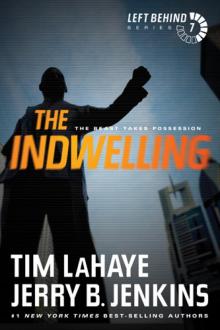 The Indwelling
The Indwelling The Left Behind Collection
The Left Behind Collection